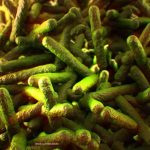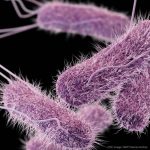A new study claims that exposure to Bisphenol A (BPA) from drinking canned beverages increases blood pressure. BPA is a chemical used to line metal cans and make plastic bottles. It has been associated with hypertension in earlier studies. This new study was a randomized crossover trial with adults age 60 hayers and older. The participants were given the same beverage in 2 glass bottles, 2 cans, or 1 can and 1 glass bottle at a time. Urinary BPA concentration, blood pressure, and heart rate variability were measured 2 hours after each beverage was consumed. Each participant visited the study site three times. Urinary BPA concentration increased after consuming canned beverages by more than 1600% compared to the concentration after drinking beverages from glass containers. Systolic … [Read more...]
Campylobacter Uses Chicken “Juice” to Form Biofilms
A new study by the Institute of Food Research has shown how the bacteria Campylobacter uses "chicken juice" to persist in the food chain, attaching to surfaces and forming biofilms that make it more impervious to cleaning. Helen Brown, a Ph.D. student at the Institute, led the study. Scientists collected liquids produced from defrosting chickens, and found that Campylobacter used those liquids to form biofilms just like Salmonella bacteria, which are special structures that help the bacteria protect the colony from environmental threats. Brown said in a statement, "we have discovered that this increase in biofilm formation was due to chicken juice coating the surfaces we used with a protein-rich film. This film then makes it much easier for the Campylobacter bacteria to attach to the … [Read more...]
White House Releases Report on Combating Antibiotic Resistance
The President's Council of Advisors on Science and Technology (PCAST) has released a report today about combating antibiotic resistance. The White House also released a National Strategy on Combating Antibiotic Resistant Bacteria and a Presidential Executive Order which emphasizes the importance of tackling this challenge. Antibiotic resistant bacteria are evolving at an alarming rate and are growing faster than the development of new antibiotics. The cost of antibiotic infections in the United States every year is more than $20 billion. The cost of lost productivity due to antibiotic-resistant infections is $35 billion every year. The World Health Organization has issued a warning too, about the dangers of not being able to treat resistant infections. PCAST recommends that there be … [Read more...]
Harvard Developing Device to Filter Pathogens Out of Blood
Researchers at Harvard University are developing a medical device that replicates the function of the human spleen. The scientists say that it can filter pathogens from E. coli bacteria to the Ebola virus. The device, called a biospleen, is under development at Harvard's Wyss Institute for Biologically Inspired Engineering. The device was primarily developed to treat sepsis, which is a blood infection. The biospleen filters out live and dead pathogens along with dangerous toxins that these pathogens sometimes create. The device removes the pathogens and toxins without having to identify them first. As drug-resistant bacteria continue to evolve and develop, creating a device that will remove these pathogens from the blood quickly without a diagnosis is becoming critical to … [Read more...]
Study on Prevalence of Listeria, Salmonella and E. coli in Pet Food
The Veterinary Laboratory Investigation and Response Network (Vet-LIRN), with the Food Emergency Response Network (FERN) and its Microbiology Cooperative Agreement Program (MCAP) labs have conducted a study to look at the prevalence of selected bacteria in pet foods. The goal was to help the Center for Veterinary Medicine prioritize future testing, and increased FERN screening for foodborne pathogens in pet food that may be a significant health risk to consumers.Six FDA FERN MCAP labs analyzed more than 1,000 samples over 2 years. The labs tested for Salmonella, Listeria species, E. coli O157:H7, and Shiga toxin-producing strains of E. coli (STEC). Dry and semi moist dog and cat foods were purchased from local stores in Phase 1. Raw dog and cat foods, exotic animal feed, and jerky … [Read more...]
Researchers Find Cinnamon a Natural Antibacterial Agent
Researchers at Washington State University have found that cinnamon may help prevent food poisoning by killing pathogenic bacteria. Their work has been published in Food Control Journal. It turns out that cinnamomum cassia oil is very effective at killing the top six non-O157 STEC (shiga toxin producing E. coli) bacteria. The major component in C. cassia oil is cinnamaldehyde. The government recently declared the six non-O157 STEC bacteria as adulterants and require testing for those bacteria in beef slaughter plants.There is a "zero tolerance" policy for those bacteria in raw ground beef and trimmings. The essential oil "killed several strains of Shiga toxin-producing Escherichia coli" according to the researchers, and it is effective in low concentrations. Just 10 drops in a liter … [Read more...]
Cornell Develops Faster Salmonella Detection
Scientists at Cornell University have developed a way to detect Salmonella bacteria faster, which could help solve food poisoning outbreaks much more quickly. The Cornell Food Safety Lab, led by dr. Martin Wiedmann and research associate Henk den Bakker, worked with the New York State Department of Health on the next-generation DNA sequencing techniques. The traditional method of identifying outbreak strains of bacteria, pulsed-field gel electrophoresis (PFGE) is not always precise enough to identify specific pathogen strains, including their relationships to each other and if they have a common origin. With Salmonella Enteritidis, for example, 85% of strains can be grouped into five PFGE types. Instead, rapid whole-genome sequencing gives doctors and public health officials much … [Read more...]
Research Finds Chobani Yogurt Fungus Potentially Harmful; Company Disagrees
Research published in the peer-reviewed journal MBio has found that the fungus that contaminated Chobani yogurt and was the trigger for a recall last fall was potentially dangerous. At that time, a researcher at Cornell University said that the mold, Mucor circinelloides, "should not pose a health risk to most consumers. Very rarely, it can act as an opportunistic pathogen, but not through food and usually only for people with compromised immune systems through inhalation." In the study, researchers at Duke University isolated M. circinelloides from the yogurt and cultured it. The isolate was obtained from a container purchased by a couple in Texas who developed nausea, diarrhea, and vomiting after consuming the product. Researchers injected the isolate into mice. Some of them got … [Read more...]
Study Identifies Risky Home Food Safety Practices
A new study at UC-Davis has identified many risky practices of consumers in their homes. The study looked at the preparation of raw poultry. The two most common mistakes were cross contamination and insufficient cooking. Christine Bruhn, director of the Center for consumer research at the university, who authored the study said in a statement, "the most surprising aspect of these findings to me was the prevalence of undercooking. We are now in summer, the peak season for foodborne illness, and these results come at a time when more consumers can benefit from being aware of better food safety practices." Those good practices include always washing hands with soap and water before cooking and after handling raw meat, poultry and eggs, never rinsing poultry in the sink, and always using … [Read more...]














